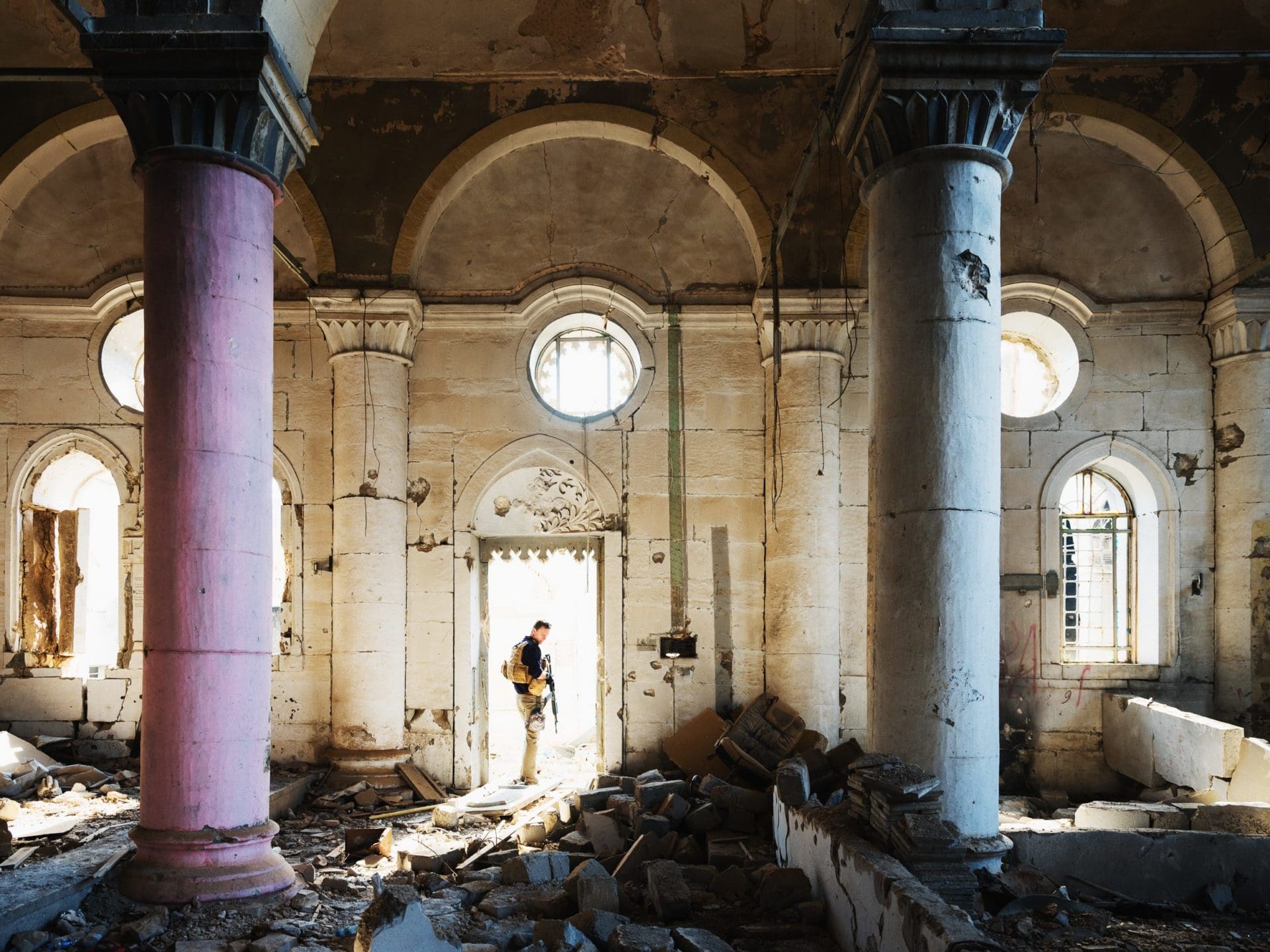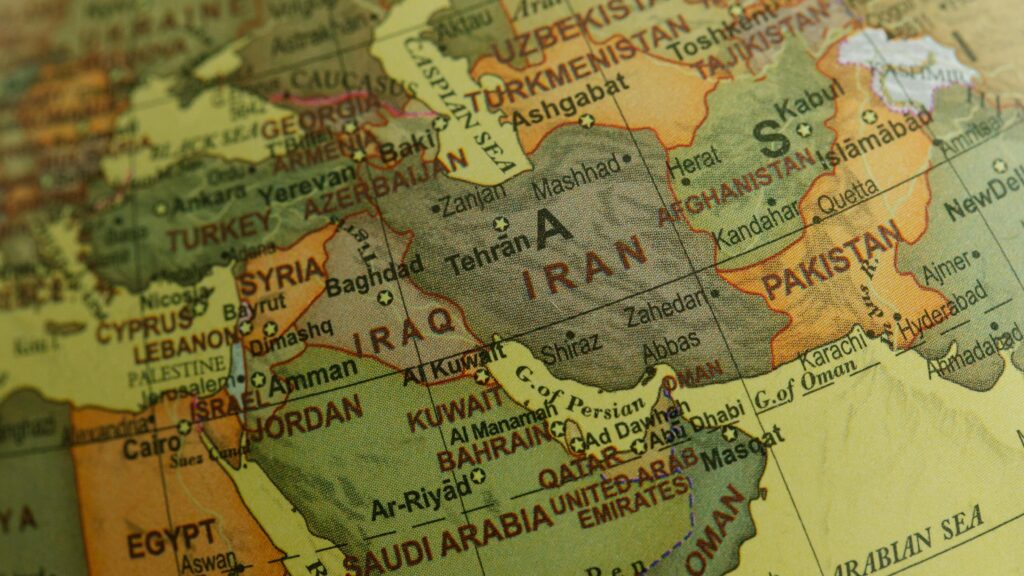Iraq is home to one of the first Christian communities in the world that was, according to tradition, established by the Apostle Thomas and Mar Addai (or Thaddeus) of Edessa, one of the seventy disciples of Christ. Under Iraqi dictator Saddam Hussein, the 1.5 million Christians—Chaldean and Syriac Catholics and Syriac Orthodox—had found a modus vivendi that allowed them to both publicly worship and carry out their activities. After the US/British-led invasion of 2003 that deposed Hussein, violence against Christians rose, with reports of abduction, torture, bombings, and killings by Islamists—the number of Christians in the entire country today has diminished to approximately 200,000.
When the self-proclaimed Islamic State (ISIS, ISIL) occupied the Nineveh Plain, which is the cradle of Mesopotamian Christianity, more than 100,000 Christians were forced to flee their homes along with other persecuted minorities, such as the Yazidis, who nearly faced extinction at the hands of the jihadists.
It has been just over five years since the defeat of ISIS. While millions of displaced Iraqis returned to their homes, many Christians never did. Those that went back, approximately 45 per cent, have been faced with great challenges rebuilding their lives, much more so than their Muslim co-nationals.
This past Easter week, at the invitation of the Chaldean Archbishop of the Archeparchy of Erbil, Bashar Warda, I had the fortune of revisiting after three and a half years various cities and villages in the Kurdistan and Nineveh regions where Christians reside, which included the village of Alq-Qosh and the city of Qaraqosh. I also revisited the war-torn city of Mosul, which has just over one hundred Christians compared to the 50,000 Christians prior to the 2003 invasion.
My journeys also took me to places where Christians are continually discriminated against by Iranian-backed militia. These militants, with the assistance of the Badr Organisation—a Shi’ite political party and paramilitary force that acts as Iran’s oldest proxy in Iraq—occupy government posts imposing their Islamic ways, while simultaneously receiving government funding for houses and employment at the cost of their Christian neighbours.
One constant burden for Iraqi Christians that continues to plague them is unemployment. Although ISIS had destroyed their livelihoods in 2014, there have been no livelihood-building programmes of any impact or significance by international NGOs. A principle reason for this injustice is, as already indicated, the aggression by the Iranian-backed militias and their jihadist mentality.
Iran’s Jihadist Doctrine
Iran’s first Supreme Leader Ayatollah Ruhollah Khomeini, whose image, along with that of reigning Ayatollah Sayyid Ali Husseini Khamenei, is displayed in every village controlled by the aforementioned militias, once stated:
‘We will export our revolution [jihad] throughout the world … until the calls “there is no god but Allah and Muhammad is the messenger of Allah” are echoed all over the world.’[1]
Traditionally, the Shi’ite idea of jihad is linked to its perceptions of historical suffering and grievances
In modern Shi’ite discourse, the view of violence as a sacred act and as a vital condition for the proper and ultimate domination of Allah has transformed the ordinary faithful from a mute voice to the emissary of a mission capable of fomenting a revolution of salvation. Traditionally, the Shi’ite idea of jihad is linked to its perceptions of historical suffering and grievances, especially in light of the Twelfth (missing) Imam, Muhammad al-Mahdi. According to Shi’ite accounts, he went into hiding circa 878, and is expected to return as the anointed one in the end-times.
The holy war is also built around the slaying of Muhammad’s grandson, Hasan (third Shi’ite caliph). Considered a martyr by Shi’ites, his death was consolidated by his family genealogy, thereby creating a continuum of purity of faith and the struggle against injustice, especially against the Sunni Arabs. Shi’ite perspicacity of persecution has over the time been associated with the feeling that the source of agony—the Sunni usurpers of the real Islam—had to be fought.
Unlike the Sunnis, who hold that the head of the Islamic body politic is to be chosen by the Ummah (community), specifically its elders, Shi’ite Muslims claim that succession is based on the blood line of the prophet Muhammad, as taught by Ja’far al-Sadiq (712–765), the sixth Shi’ite imam in the line of Muhammad Ali. Since they argue that Ali was the Prophet’s true successor, his three predecessors (recognised by Sunnis as the Rightly Guided Caliphs), Abu Bakr, Umar, and Uthman, were usurpers.
Jihad, in Shi’ite philosophical terms, is an interior striving for spiritual progress, while externally, it is finalised in military campaigns and conquests that can only be authorised by the imam, in this case the Islamic Republic of Iran.
After the 1979 Iranian Revolution, a new concept of jihad arose, one that resurrected the seventeenth-century Persian manual of law of Jami-i-Abbasi:
‘Islamic Holy war against followers of other religions, such as Jews, is required unless they convert to Islam or pay the [jizya] poll tax.’[2]
The Shi’ite creed, sparked by a sense of humiliation over Sunni despotism, ‘fostered an eschatological expectation of salvation [that] became the culture of rage and active confrontation with perceived global forces of injustice and tyranny.’[3] As per the declaration of Khomeini:
‘Islam says: “Whatever good there is exists thanks to the sword and in the shadow of the sword! People cannot be made obedient except with the sword! The sword is the key to Paradise, which can be opened only for Holy Warriors! There are hundreds of other psalms and Hadiths urging Muslims to value war and to fight. Does that mean that Islam is a religion that prevents men from waging war?” I spit upon those foolish souls who make such a claim.’[4]
What treatment is to be expected of our Christian brethren by the militias in Iraq who blindly follow the fundamentalist will of a regime that sponsors state-terrorism?
A Precarious Situation that Can Worsen
In February, the Biden administration restored a sanctions waiver that allowed countries to cooperate with Iran on civil nuclear projects. US Secretary of State Antony Blinken signed several sanctions waivers related to Iran’s so-called civilian nuclear activities. The move reversed President Donald Trump’s decision to rescind those waivers.
The waivers, which are nothing else than an appeasement, are ultimately intended to attract Iran back to the 2015 deal that it has been violating since Trump withdrew from the agreement in 2018 and re-imposed sanctions. The pretentious hope was that the Iranian regime would become a bit more open-minded towards peace in the region.
But in fact, the oppressive Iranian regime has become worse. To maintain control, the regime’s Supreme Leader, Ali Khamenei, decided to close ranks. In June 2021, Khamenei selected Ebrahim Raisi, a notorious human rights-abuser, as the regime’s president. He also appointed Gholam-Hossein Mohseni-Ejei as the Judiciary Chief. Ejei is a ruthless criminal who served as Raisi’s deputy when the latter was the Judiciary Chief from 2019 to 2021.
According to Dr. Majid Rafizadeh, a leading expert on Iran and US foreign policy and president of the International American Council, the billions of dollars in frozen assets that were released under the Obama administration to the regime only empowered its hegemony in the region:
‘In Iraq, the Iranian regime currently supports at least 40 militia groups under the banner of the Popular Mobilisation Forces. Some of these militias are known for committing war crimes, serious violations of international laws, and egregious crimes against humanity. After the nuclear deal, the Iranian leaders have even pushed and succeeded at making the Iraqi government officially recognise these militias and incorporate them into its political and security establishment.’
Approximately 200,000 Yazidis still live still live in displacement camps in the Kurdistan region, and they have no status with the UN group that is tasked with processing claims
The Iraqi Constitutional Charter approved in 2005 formally guarantees respect for religious freedom, but Article 2 actually establishes Islam as the official state religion and a primary source of legislation, much to the detriment of Christians and other religious minorities, like the Yazidis. Approximately 200,000 Yazidis still live still live in displacement camps in the Kurdistan region, and they have no status with the UN group that is tasked with processing claims. There are, however, some silver linings in the clouds with the slow rebuilding of churches and the vibrantly growing Catholic University in Erbil (CUE) in Ankawa, Kurdistan, the only Catholic institution of higher education that is recognised by an Islamic country in the Middle East.
The CUE fulfils the need for a safe study environment for Christians, Yazidis, and Muslims. It also provides the means forparents who otherwise would not be able to afford for their children to have a higher education. This also helps stop Christians from going into the diaspora.
We can only hope that the international community will embrace the truth of the discrimination against our Christian brethren and other religious minorities, and take the necessary measures to curtail jihadist aggression against them before it is too late.
[1] Dilip Hiro, The Longest War – The Iran-Iraq Military Conflict, New York, Routledge, 1989, p. 108.
[2] The Center for Security Policy, Shariah, The Threat to America,. Washington DC, Center for Security Policy, 2010, p. 325.
[3] Meir Hatina, Martyrdom in Modern Islam: Piety, Power, and Politics,. New York, Cambridge University Press, 2013, p. 81.
[4] Ibn Warraq, Why I Am Not a Muslim, Amherst, Prometheus Books, 2010, pp. 11–12.








